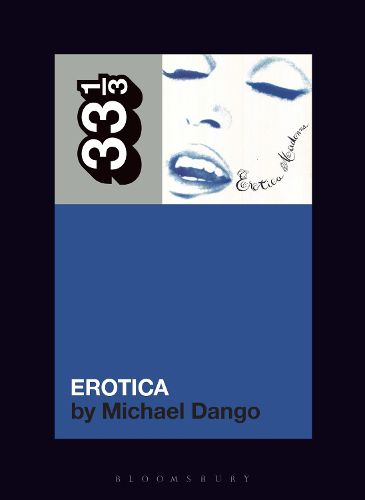Readings Newsletter
Become a Readings Member to make your shopping experience even easier.
Sign in or sign up for free!
You’re not far away from qualifying for FREE standard shipping within Australia
You’ve qualified for FREE standard shipping within Australia
The cart is loading…






Everyone wanted Madonna's 1992 album Erotica to be a scandal. In the midst of a culture war, conservatives wanted it to be proof of the decline of family values. The target of conservative loathing, gay men reeling from the AIDS epidemic wanted it to be a celebration of a sexual culture that had rapidly slipped away. And Madonna herself wanted to sell scandal, which is why she released Erotica in the same season as her erotic thriller Body of Evidence and her pornographic coffee-table book simply titled Sex.
But Erotica is more sentimental than pornographic. This ambivalence over sex is what makes the album crucial both for understanding its time and for navigating culture a generation later. As queer politics were transitioning from sexual liberation to civil rights like same-sex marriage, Madonna tried to do both. Her songs proved formative for works of queer theory, which emerged in the academy at the same time as the album. And Erotica was-and is-central to a developing consciousness about cultural appropriation. In this book, Michael Dango considers Erotica and its legacy by drawing both on the intellectual traditions at the center of today's hysteria over critical race theory and "don't say gay" and on his own experiences as a gay man too young to know the original carnage of AIDS and too old to grow up assuming he could get married. Madonna offered up Erotica as a key entry in the 1990s culture wars. Her album speaks all the more urgently to the culture wars of today.
$9.00 standard shipping within Australia
FREE standard shipping within Australia for orders over $100.00
Express & International shipping calculated at checkout
Everyone wanted Madonna's 1992 album Erotica to be a scandal. In the midst of a culture war, conservatives wanted it to be proof of the decline of family values. The target of conservative loathing, gay men reeling from the AIDS epidemic wanted it to be a celebration of a sexual culture that had rapidly slipped away. And Madonna herself wanted to sell scandal, which is why she released Erotica in the same season as her erotic thriller Body of Evidence and her pornographic coffee-table book simply titled Sex.
But Erotica is more sentimental than pornographic. This ambivalence over sex is what makes the album crucial both for understanding its time and for navigating culture a generation later. As queer politics were transitioning from sexual liberation to civil rights like same-sex marriage, Madonna tried to do both. Her songs proved formative for works of queer theory, which emerged in the academy at the same time as the album. And Erotica was-and is-central to a developing consciousness about cultural appropriation. In this book, Michael Dango considers Erotica and its legacy by drawing both on the intellectual traditions at the center of today's hysteria over critical race theory and "don't say gay" and on his own experiences as a gay man too young to know the original carnage of AIDS and too old to grow up assuming he could get married. Madonna offered up Erotica as a key entry in the 1990s culture wars. Her album speaks all the more urgently to the culture wars of today.